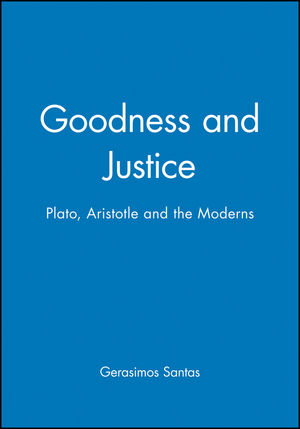Goodness and Justice: Plato, Aristotle and the ModernsISBN: 978-0-631-22886-8
Paperback
312 pages
October 2001, Wiley-Blackwell
 This is a Print-on-Demand title. It will be printed specifically to fill your order. Please allow an additional 10-15 days delivery time. The book is not returnable.
|
||||||
Part I: Introduction.
1 The Role of the Good in the Ancients and the Moderns.
2 Science and Ultimate Good.
3 Disputes and Questions about Good.
4 The Aims and Limits of this Study.
Notes.
Part II: The Socratic Good of Knowledge.
Introduction.
1 All Goods and their Socratic Rankings.
2 The Dispute with Gorgias: Is Rhetoric the Greatest Good?.
3 The Dispute with Polus about Power, Desire, and Good.
4 The Dispute with Polus about Justice and Happiness.
5 The Dispute with Callicles about Good and Pleasure.
6 Conditional and Unconditional Goods.
7 Socrates and Kant: Wisdom or the Good Will?.
8 The Conditional Value of all Goods on Virtue in the Meno.
9 Socrates and G.E. Moore on the Value of Knowledge.
10 Goods, Wisdom, and Happiness.
Notes.
Part III: The Good of Platonic Social Justice.
1 The Great Questions of the Republic.
2 The Functional Perfectionist Theory of Good.
3 The Application of the Functional Theory of Good to the City.
4 The Definitions of the Social Virtues.
5 The Role and Scope of Platonic Social Justice.
6 The Good of Platonic Social Justice.
7 The Application of Platonic Social Justice to Gender.
8 Conclusion.
Notes.
Part IV: The Good of Justice in Our Souls.
1 The Isomorphism between Social and Psychic Justice.
2 Plato's Pioneering Analysis of the Psyche.
3 Psychic Justice and the Good of It.
4 Plato and Hume on Reason or Passion as the Rule of Life.
5 The Defence of Psychic Justice as Analogous to Health.
6 The Criticism of the Democratic Individual.
7 Which is Prior, Social or Psychic Justice?.
8 The Structure of Plato's Ethical Theory.
Notes.
Part V: Plato's Metaphysical Theory of the Form of the Good.
1 Opinion, Knowledge, and Platonic Forms.
2 The Imperfections of the Sensible World.
3 Forms as the Best Objects of their Kind to Know.
4 Forms as the Best Objects of their Kind and the Form of the Good as their Essence.
5 Function, Form, and Goodness.
Notes.
Part VI: Aristotle's Criticism of Plato's Form of the Good: The Breakup of Goodness.
1 Aristotle's Arguments from Priority.
2 Breaking up Goodness: Aristotle's Argument from Homonymy.
3 Aristotle's Argument from Final and Instrumental Goods.
4 The Attack on the Ideality of the Form of the Platonic Good.
5 The Attack on the Practicability and Usefulness of Plato's Good.
6 Putting the Fragments of Goodness Back Together: Focal Meaning.
Notes.
Part VII: The Good of Desire, the Good of Function, and the Good of Pleasure.
1 The Concept of the Good.
2 Different Orectic Conceptions of the Good.
3 Aristotle's Functional Perfectionist Theory of Good.
4 Objections to Aristotle's Functional Theory of Good.
5 Orectic, Hedonic, and Perfectionist Good.
Notes.
Part VIII: The Good of Character and the Good of Justice.
1 Is Aristotle's Ethical Theory Circular?.
2 Did Aristotle have a Virtue Ethics?.
3 Aristotle's General Analysis of Virtue and Functional Good.
4 Can Moral Virtue be Explicated by Functioning Well?.
5 States of Character and Practical Wisdom.
6 Aristotle's Analysis of Justice: Not a Virtue Ethics.
7 Paucity of Practical Content: Justice and the other Virtues.
8 Summary and Conclusion.
Notes.
Bibliography.
Index.



